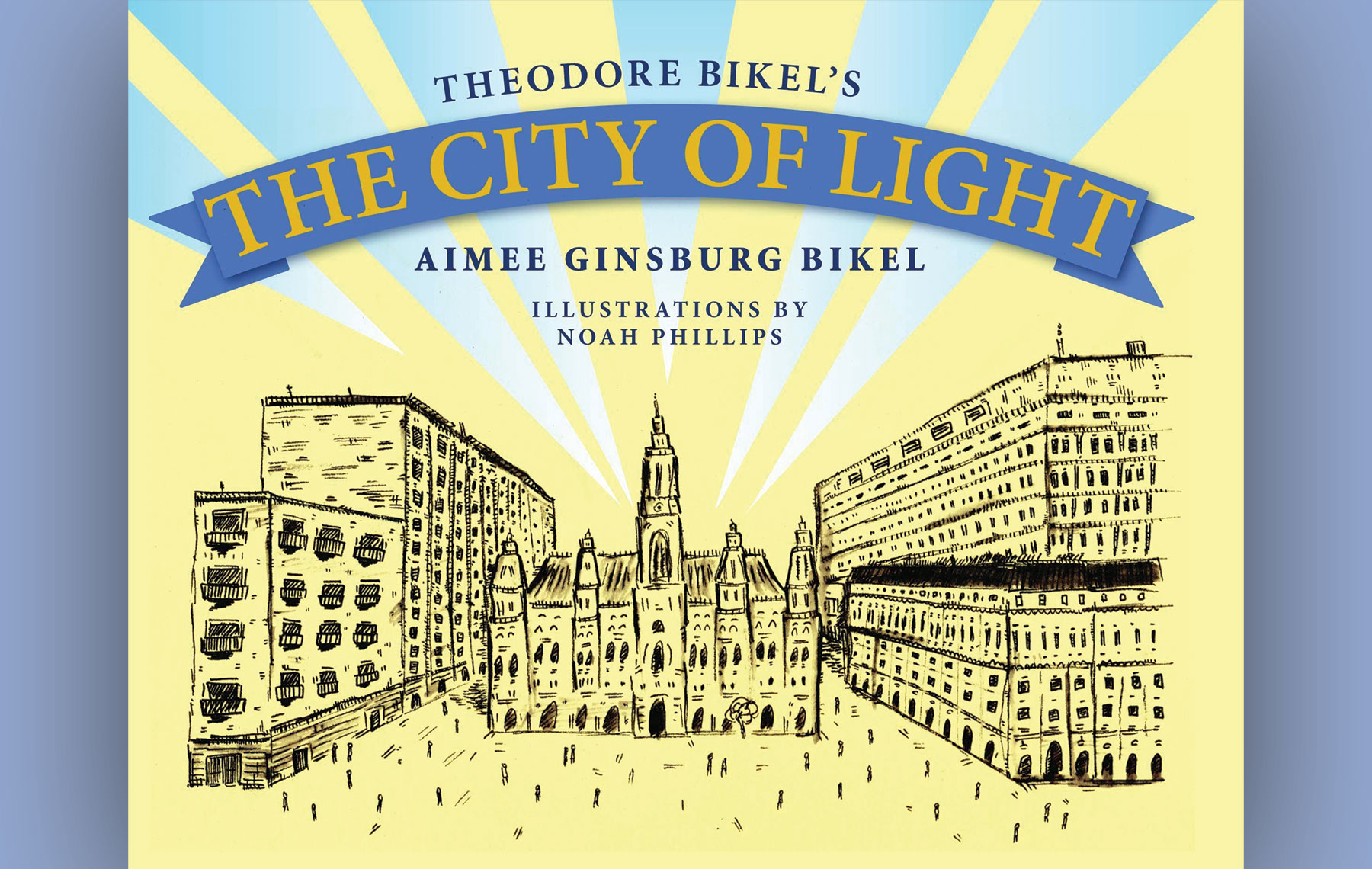
Over his long and remarkable career, Theodore Bikel achieved the status of living treasure. He is perhaps best known for the roles he played on the stage and in motion pictures and television, including the Broadway production of “Sound of Music” — the song “Edelweiss” was written especially for him — and the film version of “My Fair Lady.” And you need only listen to a Spotify playlist titled “This Is Theodore Bikel” to understand and appreciate the stature he achieved as a collector and performer of Yiddish, Israeli, American, Russian and world folk music.
Bikel died in 2015, not long after a thrilling 90th birthday concert tour that I was privileged to attend, and an especially important episode in his remarkable life story is now retold by his widow, Aimee Ginsburg Bikel, in “Theodore Bikel’s The City of Light,” a co-publication of Mandel Vilar Press and MomentBooks, with illustrations by artist Noah Phillips.
The tale was first told by Bikel himself in the pages of Moment magazine, where he described his family’s escape from Vienna in 1938 and the bittersweet journey of return that he undertook in old age. Now the story has been transformed by his widow into an illustrated children’s book, highly appropriate for Hanukkah gift giving, but full of both pleasures and challenges that will last all year long.
Ginsburg Bikel and Phillips have risen to an extraordinarily difficult task by foreshadowing the events of the Holocaust without confronting her young readers with its atrocities. Indeed, “Theodore Bikel’s The City of Light” is a book that can be used to open a conversation about events in Jewish history that will be revealed in full only when the child is much older.
“Te’o could not imagine the horrors that would come so soon,” she writes, using the nickname that Theodore Bikel would carry throughout his life. “He could not imagine that almost overnight their neighbors, their teachers, would become enemies, full of hatred and malice, simply because he was a Jewish boy.”
At the same time, and as the title suggests, the story of Bikel’s childhood harks back to the Festival of Lights and conjures up the heroic figure of Judah Maccabee himself. He loved hearing Bible stories, “some quite sad and some very funny,” but Hanukkah was always a peak moment.
“On Chanukah, there were even more songs and stories, about courage and miracles, and Oma [Grandma] made her special latkes,” the story goes. “On these special evenings, surrounded by the light of the chanukiya (menorah), and the love of his family, the boy felt especially happy.”
The peril that would fall on Te’o, his family and all of the Jews in Vienna is depicted only obliquely. The illustrations, which are endearing up until this point, suddenly turn harsh — we see a tank with a swastika flag, the figure of man who has been pushed to the ground, a broken shop window on which the word “Jude” has been scrawled. Te’o himself, we are told, is beaten by his classmates and chased by thugs. We are witnessing Kristallnacht through the eyes of a young boy who cannot fully understand what is happening but who knows enough to be terrified.
“Theodore Bikel’s The City of Light” is a book that can be used to open a conversation about events in Jewish history that will be revealed in full only when the child is much older.
“Where, oh where, is Judah Maccabee now?” young Te’o frets. “Where is the liberator of my people? But, even if he were to come, the eternal light was so thoroughly demolished that not even one drop of pure oil remained — the light could not be rekindled.”
Yet the story ends on a hopeful note. Now an old man, a grandfather himself, Te’o returns to Vienna and visits the synagogue where the eternal light was extinguished on Kristallnacht. He is inspired to sing the hopeful words of “Maoz Tzur.” “Maybe we cannot fix everything that has been broken,” he muses, “but with our song and with our love, we can always find our way back to the light.”
The book is considerably enriched by the little treasures that Ginsburg Bikel has assembled and presented to her readers. We are given his grandmother’s recipe for the honey cake that was his favorite, a glossary of Yiddish words and phrases to familiarize the reader with the mama loshen of European Jews, and the music and lyrics to a Hanukkah song that “Theo recorded especially for you, because he knew that someday you would be reading this book and thinking about all of the things you learned.” And, in fact, we can hear Theodore Bikel’s recording of the song by visiting the website where it is available (theodorebikel.org/thecityoflight).
Ginsburg Bikel provides an illuminating afterword that brings the story full circle. On Nov. 9, 2013, the 75th anniversary of Kristallnacht, Theodore Bikel performed a concert for the Parliament of Austria. “He said a prayer for the Austrian people, that they should always live in goodness and peace,” Ginsburg Bikel recalls. And she closes the book with her husband’s own words: “ ‘The mass murderers are gone,’ Theo said, his voice both soft and strong, ‘and I am still here, singing my people’s songs of peace and freedom.’ ”
His very words apply to “Theodore Bikel’s The City of Light.” Truly, and thanks to Aimee Ginsburg Bikel, Theo is still here, and we are privileged to hear him sing his people’s songs.
“Theodore Bikel’s The City of Light,” is available on Amazon.
Jonathan Kirsch, author and publishing attorney, is the book editor of the Jewish Journal.























 More news and opinions than at a Shabbat dinner, right in your inbox.
More news and opinions than at a Shabbat dinner, right in your inbox.